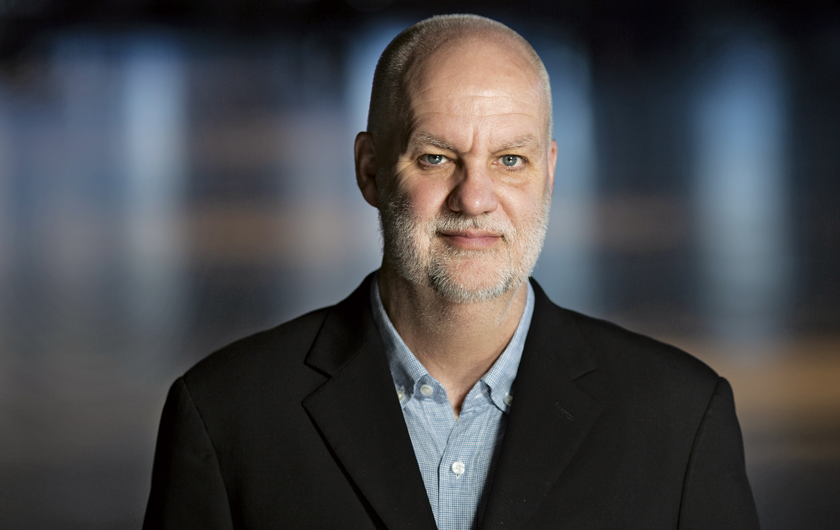“We should be celebrating the fact that people are living longer and better than ever”
By Peter Feniak
How does arguably Canada’s leading public-health journalist cope with the immensity of his job and the complexity of its focus—especially in the time of COVID-19? For one thing, André Picard gets outside.
The married father of two daughters says he clears his mind “very early in the morning,” leaving his home in Montreal’s Plateau district for a run. “I’m very close to beautiful Mount Royal,” Picard says. “I look out at the cross at the top of the mountain; I’m usually up there every day. It works for me.”
Back at his home office, it’s endless research. “Over time, you learn how to read the jargon—just absorbing information and trying to synthesize it,” he says. “I see myself as a translator, translating this mumbo-jumbo into something understandable to the public.”
Tough-minded and straightforward, Picard writes clearly about the challenges Canadians have with their health and their health-care system. His voice matters. It made a difference during the “tainted blood” tragedy of the early 1980s, which revealed the lack of a national blood policy, and it continues to inform through today’s pandemic crisis. His work has earned honourary degrees from six universities, plus eight nominations and one win for a National Newspaper Award. His many other accolades have included being named both Canada’s first “Public Health Hero” and a “Champion of Mental Health” by the Canadian Public Health Association.
Known for the sharpness of his opinions, Picard has never spared Canada’s 90,000-plus doctors. He has called them “patriarchal,” questioned the decisions and communication skills of many, and warned that the physicians of the Canadian Medical Association (CMA) were the “most powerful and prickly group in [Canada’s] health system.” This year, the doctors paid him back: for contributions to the medical profession and the public, Picard was named recipient of the Owen Adams Award of Honour, “the highest CMA award available to a non-physician.” He is the only journalist to have received the award in its 38-year history. According to the CMA, in his work, Picard has “raised awareness of pressing health issues, shared important medical research findings, and educated the public on how health care is funded and delivered.”
“It’s flattering to be recognized by a group like that,” Picard says, “and a little bit amusing. An award from doctors? They’re not always happy with me, so I really appreciate that they see beyond the disputes, the disagreements that we have, to the larger role of journalism in informing the public.” He adds in his blunt, clear-thinking way: “I never forget that I have this privileged position. I’m spoiled. I have this bully pulpit that I use. I think of all the folks I know, journalists who toil away and don’t get these prizes who are probably much more deserving.”
On Public Health
Born in Ottawa and raised in North Bay, ON, where his father worked for the provincial government, André Picard is one of three children “from a mixed family—my dad [Guy], French; my mom [Betty], English.
“They were really involved,” he remembers, “volunteering with all kinds of things like minor hockey, baseball, ladies’ recreation, all the stuff that exists in smaller communities. I wrote a book years ago about the charitable sector in Canada and that was all about what I had learned from my parents. We didn’t have any money, but that didn’t matter. You have to give back.”
His education was wide-ranging. “I went to French schools in North Bay, then did my university studies in French at the University of Ottawa.” He was studying commerce when he began writing music reviews for The Fulcrum, the student newspaper. He became the paper’s editor.
After graduating, he moved on to Carleton University for a degree in journalism, and then, in 1987, to a summer job at The Globe and Mail. “After summer, a couple of people had left and I was lucky enough to get hired just to do general assignments. I came to Montreal to fill in for someone on maternity leave—probably because I speak French. I was supposed to be there for two weeks—I’ve never left. Thirty-three years in Montreal…a pretty good temporary stint.”
Picard would soon come to national attention pursuing a public-health story he’d covered for The Fulcrum. He explains:
“At a student newspaper, you wrote about a little bit of everything. Everybody pitches in. That was a time when there was lots of activism. AIDS was coming along. The gay-rights movement was emerging on campuses. I started covering that peripherally. When I went to The Globe as a summer student, it wasn’t among the big stories. But I started covering it again—all these gay-rights protests, AIDS protests, etc. I just kept doing it.”
A Canadian public-health crisis was emerging. It began with “the AIDS epidemic.” HIV/AIDS, a deadly destroyer of the human immune system, was spreading rapidly. Though treatments were ultimately found, the condition has caused more than 33 million deaths worldwide to date. And in the interim Canada slowly came to an agonizing realization: among its causes, HIV/AIDS (and liver-damaging hepatitis C) was being transmitted by blood transfusions. In what is known as Canada’s worst preventable public-health disaster, thousands of Canadians were unwittingly infected, despite claims from the then-blood agency, the Canadian Red Cross, that chances of infection via transfusion were “less than one in a million.”
As a young journalist, Picard was an outspoken and effective voice against that complacency, searching for truth and change. Ultimately, the ensuing inquiry on the tainted-blood affair by Justice Horace Krever led to more than a billion dollars in settlements and the creation of a new agency in charge of screening, testing, and collecting blood—Canadian Blood Services (and in Quebec, Héma-Québec). Picard’s award-winning The Gift of Death: Confronting Canada’s Tainted Blood Tragedy (HarperCollins, 1995) is the definitive book on this era in public health.
Today, as the world copes with the COVID-19 pandemic, Picard approves Canada’s approach:
“You know that old joke: How do you get Canadians out of the pool? You say, ‘Get out of the pool.’ It’s cultural, largely. Canadians tend to do what they’re told. I think we were smart. Our response has been largely led by public-health leaders. We’ve let them do the public-health stuff and the politicians have focused on the economics—a very stark contrast with the United States. Most countries that have done relatively well have taken that approach: ‘Let the experts figure this out.’ It’s very much the same as the viruses SARS, Ebola, and H1N1, though the scale is very much larger. Containing something new is the challenge. This glib stuff, like ‘It’ll go away’…well, diseases don’t just go away, unfortunately.
“We’ve learned a lot. It’s probably unprecedented—the scientific knowledge that we’ve gained in such a short time on a mysterious new virus. And we’ve adapted in Canada and elsewhere to something quite new. It’s reminded us a lot of the importance of public health, something we tend to neglect. The simple stuff in life keeps us healthy, you know, washing our hands, being careful of whom we interact with. There’ve been some really good lessons here for us.”
Picard also advises against being excited by media reports of new breakthroughs in medicine, since, he says, they so often let us down after failing rigorous testing. He also urges that we must keep the “tips for better health” we constantly get from the media in perspective:
“The lifestyle stuff is not unimportant—it gives us some sense that we can do something. But when you start looking at stuff through a policy lens, through an economic, political lens, you see the world a little differently. We know, realistically, what keeps people healthy is not how many blueberries or bowls of kale they have, it’s their income and if they have a roof over their heads, if they have an education…the basic socio-economic determinants of health.”
Elected governments could improve our national health by dealing with poverty, education, and housing—those socio-economic determinants. Picard has often called them out on this.
Now, he says, “over the years, as I’ve mellowed, I’m much less critical of politicians. I’ve come to realize that politicians lead from behind—they’ll essentially do anything they think the public will tolerate. So more and more, regarding these failings we have in health and social services, I think they’re the fault of the public. We’re a little too conservative, a little too selfish to want to share our wealth. Our politicians are a little afraid to push the envelope. They could get away with a lot more and the public would not only tolerate it, but embrace it in Canada.”
Picard also deplores that politicians are increasingly interfering with civil service. “I always try to compare us to European countries rather than to the United States in my writing,” he says, “because I think to do so is more challenging to readers and makes us think more. A big difference between Canada and, say, France, is their respect for the bureaucracy. Bureaucracy’s not a dirty word. We need people who run public institutions well.”
The “Picard take” continues regularly in The Globe. He is also a public speaker, able to inform on most health subjects. The most recent of his four books, Matters of Life and Death: Public Health Issues in Canada (Douglas & McIntyre, 2017), is an impressive updated collection of columns on topics from cancer to Indigenous health to aging well. In conversation, he’s happy to share his views.
On the “grey tsunami,” the (“groundless,” he says) fear of an aging population bankrupting health care: “That expression bothers me more than anything else; we should be celebrating the fact that people are living longer and better than ever.”
On hospitals and the elderly: “Nobody should die in a hospital; that’s the last place you want to be. We should have more palliative care and hospices. A good death is as important as a good life.”
On the endless lobbying of politicians for funding by “pharma companies, advocacy groups, community groups”: “It’s part of the game; the role of the politicians is to step back and make the wisest choices, even if it’s going to upset some supporters.”
On media influence: “I hope people read me critically, the way they would anyone else. The real danger, especially with the Internet, is reading only things we agree with. Read broadly, read things you actually dislike. If you hate the National Post, well, read it, anyhow.”
On public awareness: “We have to do a much better job, especially in our educational system, in teaching how to read news in this brave new Internet world. I think the most important skill we should give our kids is how to decipher information—to tell true from false.”
Picard is also a big supporter of our nurses, suggesting that they could do up to 70 per cent of the work done by doctors just as well.
The Subject Is People
The big subjects don’t intimidate Picard. Public health, like politics and media, is ultimately personal, about people. Early on, he learned a life lesson from a much-admired journalist/social activist:
“When I started at The Globe, I sat beside June Callwood, a place they put the students because she was so intimidating.
“She was such a lovely person; she really helped me. She told me a story that I always repeat to journalism students. I was going out for a pickup—you know, you go out to get a photo from someone—in this case, someone whose child has died. We didn’t have the Internet then; you literally had to knock on their door: ‘I’m sorry for your loss, but do you have a picture of your kid?’ Really horrible. Usually they’ve just learned of the death.
“I was dreading it, saying to her, ‘I can’t believe that I have to do this.’ She sat me down and said, ‘Listen, my son died [Callwood had had a child who died young] and the most important thing that happened to me was a journalist came and asked me questions. All my friends were afraid to. They just said, ‘Oh, June, that’s so horrible.’” And they wouldn’t let her talk. She just wanted to talk about her son.
“I did that and the father just poured forth. That’s what he wanted. And then I asked, ‘Do you have a photo?’ and it was, ‘Oh, yeah, let me show you our photo album.’ ‘Do you mind if we use this one?’ ‘Oh, sure, sure.’ It’s about giving and listening to people—which is the single most important thing we do as journalists. Just sit back and listen.
“I meet interesting people every single day. But I tell journalism classes, ‘You know, the stories that stick with you the most are not the ones you think.’ I spent years writing stories about tainted blood. That was really important. There are people I remember really well. But there are other, sort of smaller stories, and people who stick with you forever. In 1987, I wrote about a woman whose son with schizophrenia killed himself. She started this little group of parents with children like him. And 35 years later, I still exchange e-mails with her. She’s now in her 90s in a care home. We just have these little chats on e-mail: ‘Hi, how’re you doing?’ You just never know when you’re going to connect with someone.”
Care homes are very much on Picard’s mind. He’s completing work on his next book, due in 2021, titled Neglected No More: The Urgent Need to Improve the Lives of Canada’s Elders in the Wake of a Pandemic. He continues research for his much-read column with dedication.
Being André Picard has changed over the years. People now pick his brain at social gatherings and say “Hello” when he travels. “I guess the saving grace for me is that in Quebec, The Globe and Mail is pretty well unknown outside of Anglo circles. I like the anonymity. I remember when my kids were younger: we were in Vancouver and people were coming up to me and saying, ‘Are you Picard from The Globe? You have lots of readers in Vancouver.’ And my kids were stunned. It was like, ‘Why does he know you?’”
With those kids—daughters Anaïs and Raphaëlle—now older and he and his wife, Montreal Gazette journalist Michelle Lalonde, nearing empty-nester designation, Picard keeps life simple:
“I do my work. I do my running. Watching your kids grow up and what becomes of them—stuff like that is what I really look forward to. I think that’ll be fascinating.”
Photo: John Kenney.






